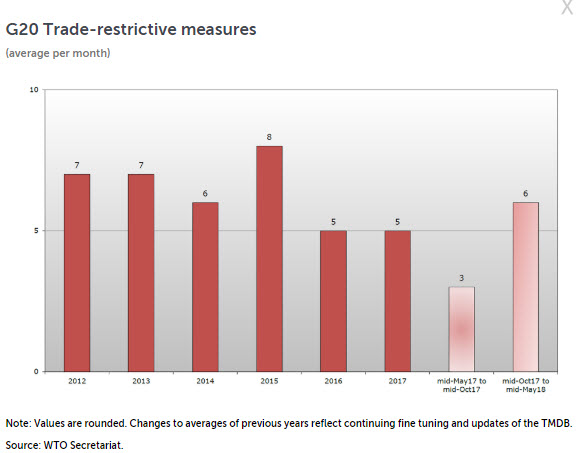New Trade Restrictions from G20 Economies Double
The World Trade Organization’s 19th monitoring report on Group of 20 (G20) trade measures shows that new trade-restrictive measures have doubled compared to the previous review period. The report also shows that G20 economies continue to implement trade-facilitating measures, with the rate increasing slightly.
The report covers the period from mid-October 2017 to mid-May 2018. A total of 39 new trade-restrictive measures were applied by G20 economies during the period, including tariff increases, stricter customs procedures, imposition of taxes and export duties. This equates to an average of almost six restrictive measures per month, which is significantly higher than the three measures recorded during the previous review period.

G20 economies also implemented 47 measures aimed at facilitating trade during the review period, including eliminated or reduced tariffs, simplified import and export customs procedures and reduction of import taxes. At an average of almost seven trade-facilitating measures per month. This is marginally higher than the six measures recorded in the previous reporting period (mid-May to mid-October 2017).
The estimated trade coverage of trade-facilitating measures implemented by G20 economies ($82.7 billion) exceeded the estimated trade coverage of import-restrictive measures ($74.1 billion), but is approximately half the trade coverage reported for these measures during the same period in 2016-17. The trade coverage of import-restrictive measures is more than one-and-a-half times larger than that during the same period in 2016-17.

that matters most
Get the latest maritime news delivered to your inbox daily.
The report’s findings should be of “real concern” to the international community, according to Director-General Roberto Azevêdo. “Additional trade-restrictive measures have been announced in the weeks since this reporting period, and therefore the deterioration in trade relations may be even worse than that recorded here. This continued escalation poses a serious threat to growth and recovery in all countries, and we are beginning to see this reflected in some forward-looking indicators. I urge G20 leaders to show restraint in applying new measures and to urgently de-escalate the situation.”
The G20 economies are Argentina, Australia, Brazil, Canada, China, France, Germany, India, Indonesia, Italy, Republic of Korea, Japan, Mexico, the Russian Federation, Saudi Arabia, South Africa, Turkey, the United Kingdom and the United States, as well as the European Union.
